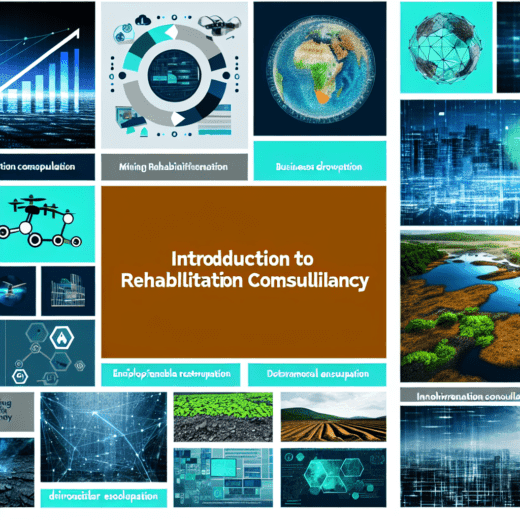Introduction to Mining Rehabilitation Consultancy
In the modern industrial landscape, mining stands as one of the most significant activities influencing economic development. However, it leaves a profound impact on the environment, necessitating a robust approach to rehabilitation. Mining Rehabilitation Consultancy emerges as a crucial player in ensuring environmental sustainability by offering expert advice on post-mining restoration. As the demand for ethical and eco-friendly business practices grows, the consultation industry finds itself primed for innovation and market disruption. This comprehensive analysis delves into the multifaceted aspects of starting a Mining Rehabilitation Consultancy, focusing on innovation, challenges, and potential opportunities within the startup ecosystem.
Innovation Potential in Mining Rehabilitation
Innovation in mining rehabilitation consultancy involves developing and applying new methods and technologies to restore ecosystems. Startups in this field have room to innovate in several areas, such as:
-
Technology Deployment: Utilizing advanced technologies like GIS (Geographic Information Systems), drones, and AI to assess and monitor ecological impacts effectively. Innovative tech solutions are pivotal in offering precise data and insights, enabling more accurate rehabilitation strategies.
-
Sustainable Practices: Advising on the integration of sustainable practices right from the extraction process to rehabilitative efforts. Startups that specialize in reclaiming disturbed land for agricultural use or biodiversity conservation stand out in their innovative potential.
-
Customized Solutions: Tailoring rehabilitation plans to the specifics of each environmental context and the type of mineral extraction being conducted. Providing bespoke solutions helps consultants recommend the most efficient and feasible restoration strategies, demonstrating a strong value proposition to clients.
Market Disruption and Opportunities
The mining sector’s traditional reluctance to adopt change paves the way for startups to introduce disruptive solutions. Here’s how:
-
Regulatory Compliance: Increasingly stringent environmental regulations push mining companies to seek consultancy services to ensure compliance, offering startups a growing market.
-
Corporate Social Responsibility (CSR): As the pressure mounts on industries to demonstrate CSR, mining companies prioritize rehabilitation, positioning consultancy services as essential partners in their operational blueprint.
-
International Expansion: Opportunities exist for consultancy firms to extend services globally, particularly in regions with burgeoning mining activities but lacking robust rehabilitation frameworks.
- Case Studies and Success Stories: For instance, Australia-based URS Corporation implemented an innovative approach using native plant species effectively to rehabilitate a former coal mining site, showcasing a successful model for similar projects globally.
Key Challenges
Despite the opportunities, the pathway to establishing a successful Mining Rehabilitation Consultancy is not without its challenges:
-
Funding Limitations: Capital required for extensive research and technological investments can be prohibitive. Startups often need comprehensive fundraising strategies and innovative business models to mitigate financial risk.
-
Scaling Operations: Scaling a consultancy requires navigating regional regulatory environments, which can differ significantly. Developing flexible yet standardized procedures for cross-border operations is complex but crucial for growth.
-
Talent Acquisition and Retention: Attracting skilled professionals with specialized knowledge in ecology, environmental science, and regulatory affairs can be challenging but is vital for operational success.
Strategies for Success
Fundraising and Financial Management
To overcome funding hurdles, startups must showcase clear, potential returns on investment:
-
Venture Capital and Angel Investors: Target investors who have an interest in sustainable and ecological ventures. Highlighting the dual benefit of environmental betterment and business success can be compelling.
-
Public-Private Partnerships: Collaborating with governmental and non-governmental organizations can provide access to grants and funding allocations aimed at environmental projects.
-
Revenue Models: Implement diverse revenue streams, such as offering digital tools for self-assessment or creating subscription-based advisory services.
Market Positioning and Product-Market Fit
Achieving product-market fit involves understanding client needs and matching them effectively with service offerings:
-
Customer-Centric Offerings: Feedback loops with clients can refine services and ensure they align with client objectives. For instance, developing workshops or training programs about sustainable practices for client teams builds trust and fosters long-term relationships.
-
Differentiation through Expertise: Positioning the startup as a thought leader through research publications or industry reports can enhance credibility and market presence.
Customer Acquisition and Retention
Building and maintaining a strong customer base requires strategic outreach and continuous engagement:
-
Networking and Partnerships: Forming alliances with industry leaders and stakeholders increases visibility. Participating in conferences and symposiums can also facilitate vital industry connections.
-
Digital Marketing and Branding: Leveraging social media platforms, and creating informative content can position the brand as an industry authority.
-
Loyalty Programs: Offering incentives for long-term partnerships can foster loyalty and promote sustained business growth.
Distinctive Aspects of Business Models or Technologies
Successful startups often integrate unique business models or technologies to stand out:
-
Platform-Based Models: Digital platforms offering bundled services, from preliminary assessments to post-project monitoring, can attract a wider client base.
-
Data-Driven Decision Making: Offering data analytics services as part of consultancy facilitates better decision-making processes for clients, enhancing perceived value.
-
Sustainability Certifications: Developing proprietary certification processes for purified rehabilitated sites can create an additional revenue stream and differentiate services offered.
Conclusion
Mining Rehabilitation Consultancies have a vital role to play in the evolution towards sustainable mining practices. Startups venturing into this field must harness innovation while addressing inherent challenges strategically to seize emerging opportunities. By developing a solid foundation in financial planning, scaling operations, and continuous improvement of service offerings, these consultancies can pave the way for industry-wide transformation. As environmental advocacy continues to grow in prominence, so too will the demand for expert consultancy in mining rehabilitation, signaling a promising avenue for entrepreneurs and investors alike.

